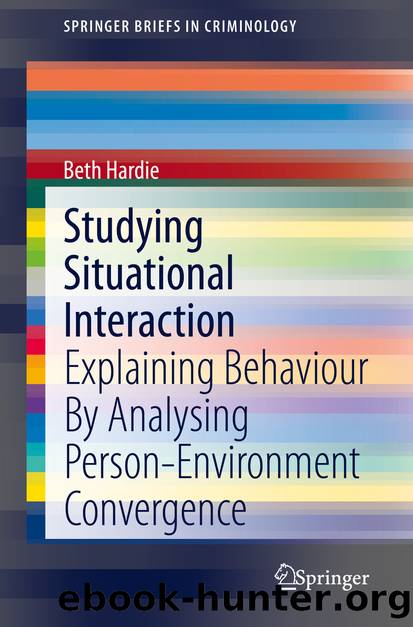Studying Situational Interaction by Beth Hardie

Author:Beth Hardie
Language: eng
Format: epub
ISBN: 9783030461942
Publisher: Springer International Publishing
Making Do Without Situation-Level Exposure Data
Chapter 1 argued that studying the convergence of individuals in environments is the most appropriate way to study human action, including crime. Such situational interaction refers to mutual interdependency in action outcomes, i.e. the inseparability of individual and environment. Fully appropriate ‘situational analysis’ of behaviour therefore must identify the particular convergence of (features of) people and (features of) the settings they are in that brings about a particular action, and this analysis requires a specific kind of spatio-temporally linked data (Chaps. 2 and 4; Hardie & Wikström, in press; Wikström, Ceccato, Hardie, & Treiber, 2010; Wikström, Mann, & Hardie, 2018). Such data can be called situation-level exposure data, and records whether or not a person (with particular features) was exposed to various particular environmental features at various specific (possibly continuous) points in time and space, and also records the behavioural outcome of each particular convergence (Chap. 2).
There are very few studies in any field that collect truly situation-level data about the content of real-world interactions and resultant behavioural outcomes. Criminological research has not traditionally focused on person-environment interaction in action outcomes (Chap. 1). This means there has not been a demand for situation-level data that captures the convergence of features of individuals and the features of settings to which they are exposed. The collection of precise, rich, and complex situation-level exposure data is also resource intensive. Low demand and high cost means that this specialist data is rare. It is much cheaper and simpler to collect generalised individual- or environment-level exposure data, which captures a total amount of a particular kind of exposure an individual or area experienced over a certain time period, alongside collecting independent counts of crime, aggregated to individuals or areas. Not only is this kind of data collection cheaper, but it can often be more efficient too because these kinds of generalised individual- or environment-level variables have sometimes already been collected by existing studies. The barriers to situation-level data collection mean that many studies of person-environment interaction analyse individual- or environment-level exposure data instead. There is discussion and detail elsewhere in the volume about these different kinds of data (Chap. 2) and collection methods (Chap. 4).
However, this solution to the lack of situational data is in itself problematic. Chapter 2 describes that whilst situation-level exposure data can be assessed for evidence of the convergence of features of individuals and features of environments in particular action outcomes, generalised individual- or environment-level exposure data only allows assessment of statistical interaction (dependence) in aggregated outcome measures, most commonly using regression methods. Using independent individual- or environment-level exposure data to draw conclusions about situational interaction requires an assumption of co-occurrence of the exposure and the action. This is problematic because whilst an individual may often be exposed to certain features of environments and also often offend, this does not determine that they were exposed at the time of all, or indeed any, of the offences. Ultimately, using regression analysis of exposure data collected at or
Download
This site does not store any files on its server. We only index and link to content provided by other sites. Please contact the content providers to delete copyright contents if any and email us, we'll remove relevant links or contents immediately.
Rewire Your Anxious Brain by Catherine M. Pittman(18654)
Talking to Strangers by Malcolm Gladwell(13370)
The Art of Thinking Clearly by Rolf Dobelli(10489)
Mindhunter: Inside the FBI's Elite Serial Crime Unit by John E. Douglas & Mark Olshaker(9343)
Becoming Supernatural by Dr. Joe Dispenza(8217)
Change Your Questions, Change Your Life by Marilee Adams(7781)
Nudge - Improving Decisions about Health, Wealth, and Happiness by Thaler Sunstein(7707)
The Road Less Traveled by M. Scott Peck(7603)
The Lost Art of Listening by Michael P. Nichols(7506)
Mastermind: How to Think Like Sherlock Holmes by Maria Konnikova(7347)
Enlightenment Now: The Case for Reason, Science, Humanism, and Progress by Steven Pinker(7313)
Win Bigly by Scott Adams(7198)
The Way of Zen by Alan W. Watts(6614)
Daring Greatly by Brene Brown(6513)
Big Magic: Creative Living Beyond Fear by Elizabeth Gilbert(5771)
Grit by Angela Duckworth(5615)
Ego Is the Enemy by Ryan Holiday(5448)
Men In Love by Nancy Friday(5240)
The Laws of Human Nature by Robert Greene(5208)
